Genre: Racing Developer: Hitmaker Publisher: Sega Ent. Players: 1 Released: 2000
I’ve been playing video games for almost 40 years, and during that time I’ve seen my fair share of arcade classics. From publishers long gone to some that are still kicking around today, I can think of a virtually endless list of hits that in some way impacted my youth. Most of them are Sega games, and that has more to do with when I grew up than anything else. Sega was unstoppable in arcades during the ‘80s, and it seemed to always have a new machine available every time I went into my local game room. Back then, every corner store had arcade cabinets, so finding a Sega game to play wasn’t particularly difficult.
What makes Crazy Taxi so special to me is that it managed to perfectly capture that same feeling well over a decade later, during a period when arcades were dying. By the time it was released in 2000, I was married and teaching, far removed from my after-school arcade romps (well, I still romped, but for not as long and for far less money). At a time when people were opting to stay home and play their video games on home consoles, Hitmaker released a title that made me look forward once more to getting a pocket full of tokens. So much of what makes Crazy Taxi one of Sega’s most original and intense classics has to do with its great premise and rock-solid gameplay, and we’ll get to that in a minute. Beyond that, however, is a far more impactful personality that has made the game stand out for me so many years after its release.
Along with being a reminder that Sega’s most consistent and creative arm was its arcade division, Kenji Kanno’s masterpiece is also a time capsule of its era. Gamers who remember the late ‘90s can recall what it was like to go to Tower Records or drive around listening to The Offspring and Bad Religion. The two city stages in Crazy Taxi are obviously modeled after San Francisco, which made them seem more real. Customers on their way to places like Pizza Hut and KFC make it even more of a concrete experience, and the entire package remains an example of Sega while it was still at the peak of its arcade creative powers. Even after all these years, I get something more tangible, more authentic from the experience of playing Crazy Taxi than I do with other arcade titles of this period. It’s almost like the game is frozen in time for me, refusing to let go of an era that was already done by the time it came out. Crazy Taxi is like one final, punk-infused middle finger from the ’90s to Father Time and a changing society.
Virtually all this mad essence was successfully transferred to the Dreamcast port. Unlike many other arcade racers that are converted, the immersion doesn’t suffer from having to use a controller instead of a steering wheel. In fact, I actually prefer to use the analog stick than the steering wheel. Hitmaker did a splendid job of bringing over the arcade game almost intact, and players can pick their favorite driver and race all over town to make some CRAZY MONEY. The time extension-based gameplay, which Kanno chose over the traditional practice of a set time for a single coin, is here, but it can be adjusted to the player’s liking. Similar to many ports of OutRun, the timer can be set very high for easier gameplay, adding more time for each passenger transported. The traffic can be equally adjusted, and both options combine for gaming sessions that aren’t too long but don’t feel arcade-short either. The arcade and original modes also have options for playing for a fixed amount of time (three, five, or 10 minutes). Crazy Taxi is a game one plays for score and rank, and these options make for some great challenges. Hitmaker added a new course for the original mode, though everything else remains the same. This choice was a wise one, since the gameplay doesn’t really need any alteration. I appreciated being able to jump right into the new city layout without having new controls to worry about. Players who have mastered the original course now had a whole new layout to learn, and that’s what makes the game so much fun. Since customers pay out tips based on driving, it’s vital to learn where the best ramps and places to drift are so the most money can be made off a fare. It’s all about those license rankings!
Hitmaker obviously knew that while the arcade’s offerings were great for a few tokens worth of play, they wouldn’t last the hours of play that Dreamcast owners were going to give Crazy Taxi. For this reason, it added the wonderful Crazy Box mode. Players must complete several crazy mini game challenges, which Kanno and his team added to help players to improve their driving skills and master key moves like the crazy dash and crazy drift. The games are simple but quite fun, and I wouldn’t be surprised if this mode served as the inspiration for OutRun 2’s Heart Attack Mode. Given that an entirely new course was also made for this version, the Crazy Box mode is just a wonderful bonus that helps give this port some needed legs on the Dreamcast.
My only fault with this port of Crazy Taxi isn’t a knock on the conversion but an observation regarding the game’s basic design. Hitmaker designed Crazy Taxi to be played in short spurts in the arcade, and this doesn’t really hold up on a home console. Even with all the added bonuses, the game can become a bit tiring after a while. To fully enjoy it, one has to approach it with the mentality that this isn’t a game meant for marathon sessions. It’s kind of a “play it when the urge hits you” kind of release, one that’s not supposed to go on for too long (the soundtrack might grate on some people after a while, too). I personally fire it up for a bit every now and then, knowing full well that I don’t plan to spend hours with it. One can’t fault Crazy Taxi for this reality. It’s a product of the arcade, and just as one would not expect a lion to become a house cat when kept indoors, one should not expect Crazy Taxi to change its gameplay for a home port. Such an alteration would be against its very nature and ruin what made it so special in the first place.
Other than its necessity to adhere to its arcade roots, the Dreamcast port of Crazy Taxi is one game that should unquestionably be in the library of every owner of the console. It’s immensely fun, incredibly well-made, and the kind of game Sega was unparalleled at making. The incredibly fluid gameplay, spectacular presentation, rockin’ soundtrack, the plethora of gameplay options, and the fact that it’s on the Dreamcast make this version perhaps the best one to own. Crazy Taxi is simply one of the Dreamcast’s defining titles.
YA YA YA YA YA!
SCORE: 9 out of 10

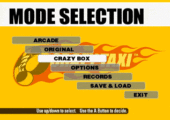
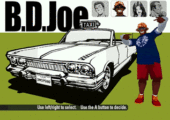
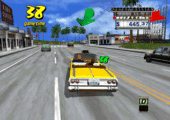
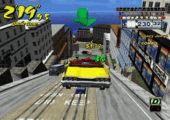
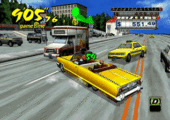
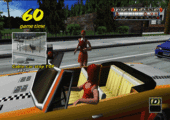
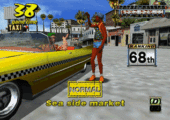
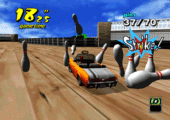
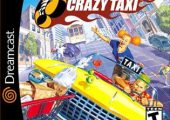
Recent Comments